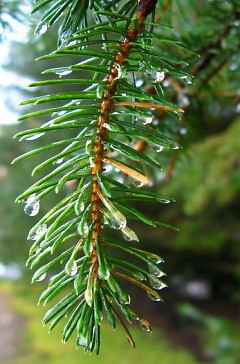To date, this has been West Michigan’s second warmest winter on record since 1932. As we all know, a lot has happened since then in the way of CFC emmissions and greenhouse gas increases. This year's unseasonably warm temperatures and below average snowfall beg the question, "why is this happening?" Could this have anything to do with climate change or does the weather just do strange things sometimes?
Local meteorologists have varying perspectives on the issue but most agree on some level that climate change is occurring and is something that people should be concerned about.
“I have no doubt that the human species is affecting our weather and climate,” said Peter Chan, Chief Meteorologist for Grand Rapids-based television station FOX-17. “The topic of global warming is emotionally charged. Ultimately, it forces us to look at ourselves and our role in the environment and the earth’s system, and that’s very uncomfortable because it gets to our core values, our religious values, our economic system. It forces us to think about having to change some of these long-cherished notions, and that is not popular because people are too invested in the current economic and political structure.”
Chan highlighted the dramatic declines of low-latitude and mid-latitude glaciers and snowcaps in mountainous areas such as the Alps in Europe, Glacier National Park in Montana, and Mt. Kilimanjaro in Tanzania as evidence of the magnitude of the issue. The evidence exists in West Michigan, too.
“As we’ve seen in the Great Lakes region, the onset of lake ice – especially as measured from, say, Grand Traverse Bay – the date at which the Bay freezes and then thaws in the spring has grown shorter," said Chan. "And this year, right now, Grand Rapids is on its way to its second warmest winter. If things continue as they do, this could be a very significant winter as far as lack of snowfall and mild temperatures, something we haven’t seen since the 1930s.”
Global warming is making a noticeable impact on the climate, Chan said, noting that the U.S. government has already adjusted the hardiness zone for planting. Many gardeners are discovering that they are able to grow plants much farther North than they were previously able.
“If you cut down one tree in your yard, you are changing the microclimate of that area,” Chan said. “If you cut down a big oak tree, you’re letting light into an area that was formerly shaded, and there may have been certain plants growing there that now can’t because they’re getting full sunlight, and you’ve slightly warmed the temperature of that area…and people don’t think about that because, you know, it’s their property. They might take down several trees, but they’re not the only ones doing this. This is being repeated across the earth millions of times, whether commercially or just for somebody’s own private interest, and you can’t tell me that that’s not affecting the system.”
Not everyone is as convinced about the human role in global warming as Chan. Chris Gervat of West Michigan-based CBS affiliate WWMT believes that scientists haven’t accumulated enough data to conclusively say that global warming is occurring and humans are responsible.
“We don’t have a big enough sample size to know what human beings are doing to the planet and what the effects are going to be,” he said. “The science behind most of this is still growing. I’m not saying that global warming exists. We do have warming and cooling periods. The term global warming kind of bothers me because we are in an interglacial period…temperatures are going up, but I’m not calling it global warming. It’s part of a natural ebb and flow of our climate.”
“Greenhouse gas levels will go up [naturally]," Gervat said, "but we are making them go up faster than they should and I don’t know what the end result of that will be.”
Julie Winkler, a professor who researches synoptic climatology, applied climatology and regional climate change at Michigan State University, said that it is very difficult to separate out an anthropogenic climate change - a human-induced one - from natural climate variability. However, she said, when we look at projections using global climate models, they are in general agreement that warming is expected in the coming decades.
Winkler was also hesitant to use the term “global warming” to describe these trends.
“It’s not political,” she said. “Global warming is too narrow of a term. The preferred terminology is ‘climate change.’ It’s a more accurate, comprehensive term.”
According to Winkler, there are factors that contribute to global climate change besides increasing temperatures, and the term “global warming” fails to recognize them.
“We know that greenhouse gases have increased," said Winkler. "That’s a black and white issue … the potential consequences are sufficient that everybody should be concerned about this.”
The federal government's stance on the issue acknowledges human culpability in climate change. Jim Masco is a meteorologist based in West Michigan for the National Oceanic and Atmospheric Administration. According to Masco, the official position of NOAA is that “there are man-made circumstances that are contributing to increases in global temperature.”
The Rapidian, a program of the 501(c)3 nonprofit Community Media Center, relies on the community’s support to help cover the cost of training reporters and publishing content.
We need your help.
If each of our readers and content creators who values this community platform help support its creation and maintenance, The Rapidian can continue to educate and facilitate a conversation around issues for years to come.
Please support The Rapidian and make a contribution today.


Comments
Hi, Steven - We appreciate the feedback on this piece and are glad you enjoyed it. In response to your comment, "We need more environmental coverage...it would be nice to have a weekly column or something."- We wanted to let you know that you can expect to see more coverage like this on an ongoing basis from The Environmental Bureau, a news bureau housed at the West Michigan Environmental Action Council and dedicated to covering environmental issues. For quick access to these pieces, simply click "Bureaus" at the top of the page, and go to "WMEAC Bureau". Thank you for reading!